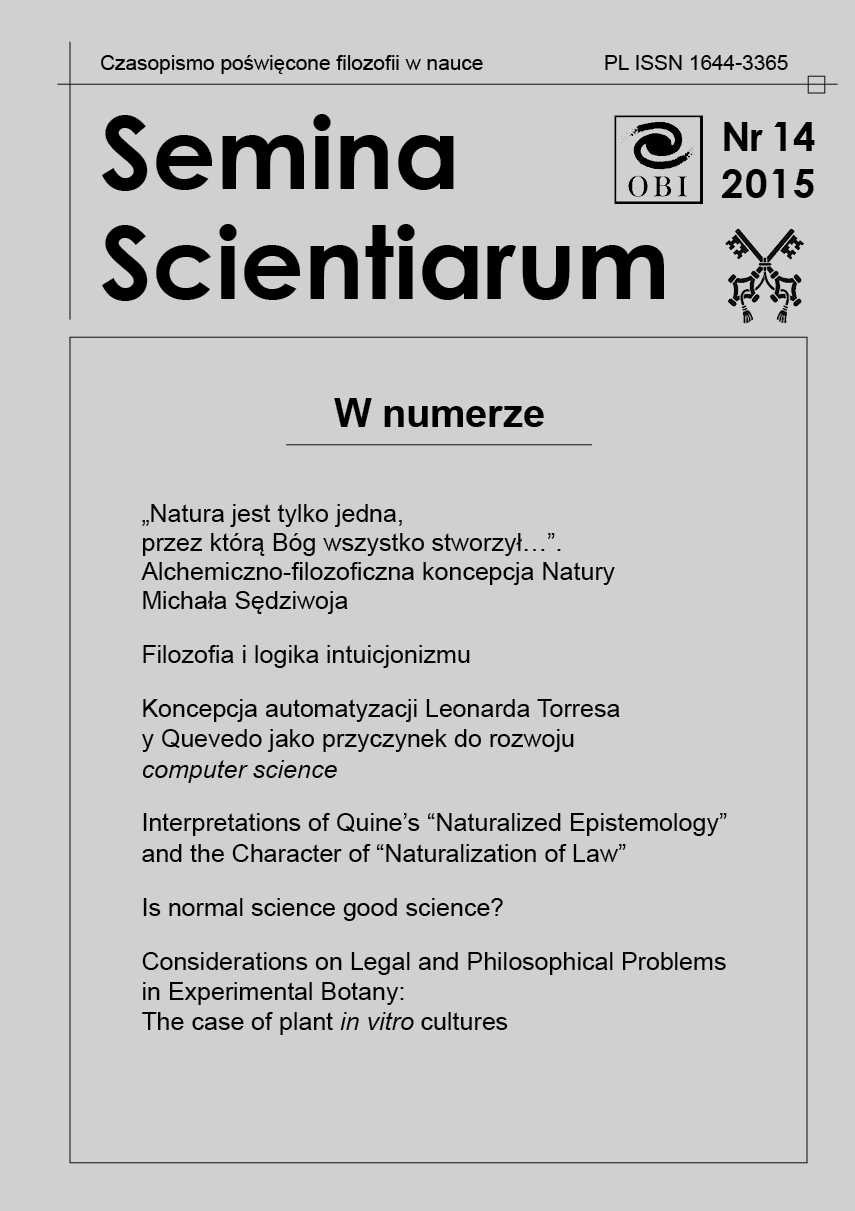„Natura jest tylko jedna, przez którą Bóg wszystko stworzył…” Alchemiczno-filozoficzna koncepcja Natury Michała Sędziwoja
DOI:
https://doi.org/10.15633/ss.1076Słowa kluczowe:
Michael Sendivogius, alchemy, philosophy, Nature, word, creation, GodAbstrakt
Nature was the central idea on which Michael Sendivogius based his alchemico-philosophical system. Therefore, the aim of this article is to show what the Polish alchemist understood as Nature and what was its function in the world according to him. Sendivogius believed that the material world originated from the will of the good God. However, the act of divine creation was reduced to the moment of its coming into being through the creation of the matter (ex nihilo) and general organization of its universum. Nature, on the other hand, is responsible for the present form of the material world. For Sendivogius, Nature is an element with which the world has been enriched by the will of God, and which is responsible for its permanent creation. According to our alchemist, the world is constantly being created and transformed, and Nature is its creative principle. This article explains how Nature creates this world and particular beings existing in it. Furthermore, it discusses the problem of the nature of Nature itself. Sendivogius considered Nature to be not only a creative principle but also a kind of law determining interactions of beings which ensured their unity and harmony. Nature is not everlasting but created in the same way as the world. Therefore, the article presents also what the Alchemist thought about the Nature’s relation to its Creator, that is to God.
Bibliografia
Arystoteles, O powstawaniu i ginięciu, tłum. L. Regner, Warszawa 1981.
Bugaj R., Michał Sędziwój (1566–1636): życie i pisma, Wrocław 1968.
Bugaj R., W poszukiwaniu kamienia filozoficznego. O Michale Sędziwoju najsłynniejszym alchemiku polskim, Warszawa 1957.
Bugaj R., Wstęp, [w:] M. Sędziwój, Traktat o kamieniu filozoficznym, tłum. R. Bugaj, Warszawa 1971, s. 9–93.
Cortesi P., W poszukiwaniu kamienia filozoficznego. Historia i sekrety alchemii, tłum. L. Rodziewicz, Kraków 2005.
Eliade M., Mit alchemii, [w:] M. Eliade, Alchemia azjatycka, tłum I. Kania, Warszawa 2000, s. 79–115.
Kazibut R., Alchemia pomiędzy nauką a pseudonauką. Studium historyczno-metodologiczne, „Zagadnienia Naukoznawstwa” 1 (2012) 191, s. 27–47.
Koyré A., Mistycy, spirytualiści, alchemicy niemieccy XVI wieku, tłum. L. Brogowski, Gdańsk 1995.
Liana Z., Inspiracje chrześcijańskie w rozwoju myśli naukowej, [w:] M. Heller, Z. Liana, J. Mączka, W. Skoczny, Nauki przyrodnicze a teologia: konflikt i współistnienie, Tarnów 2001, s. 75–93.
Redgrove H. S., Alchemy Ancient and Modern, London 1922.
Sędziwój M., Rozmowa Merkuriusza, Alchemika i Natury, [w:] M. Sędziwój, Traktat o kamieniu filozoficznym, tłum. R. Bugaj, Warszawa 1971, s. 212–231.
Sędziwój M., Traktat o kamieniu filozoficznym albo Nowe światło chemiczne, [w:] M. Sędziwój, Traktat o kamieniu filozoficznym, tłum. R. Bugaj, Warszawa 1971, s. 150–211.
Sędziwój M., Traktat o siarce, drugim pierwiastku Natury, [w:] M. Sędziwój, Traktat o kamieniu filozoficznym, tłum. R. Bugaj, Warszawa 1971, s. 232–295.
Sędziwój M., 55 listów filozoficznych, [w:] M. Sędziwój, Traktat o kamieniu filozoficznym, tłum. R. Bugaj, Warszawa 1971, s. 296–393.
Pobrania
Opublikowane
Numer
Dział
Licencja
Twórca oświadcza, że przysługują mu prawa autorskie do utworu i że nie są ograniczone w zakresie objętym niniejszym oświadczeniem oraz że utwór jest dziełem oryginalnym i nie narusza praw autorskich innych osób.
Twórca zezwala Uniwersytetowi Papieskiemu Jana Pawła II w Krakowie na nieodpłatne, niewyłączne i nieograniczone w czasie korzystanie z utworu, to jest:
- utrwalanie i zwielokrotnianie: wytwarzanie egzemplarzy utworu techniką drukarską, reprograficzną, zapisu magnetycznego oraz techniką cyfrową;
- obrotu oryginałem albo egzemplarzami, na których utwór utrwalono (wprowadzanie do obrotu, użyczenie lub najem oryginału albo egzemplarzy, publiczne wystawienie, wyświetlenie, a także publiczne udostępnianie utworu w taki sposób, aby każdy mógł mieć do niego dostęp w miejscu i w czasie przez siebie wybranym);
- włączenie utworu w skład utworu zbiorowego;
- udzielanie przez Uniwersytet Papieski Jana Pawła II w Krakowie sublicencji Creative Commons Uznanie autorstwa-Użycie niekomercyjne-Bez utworów zależnych 3.0 Polska
Uniwersytet Papieski Jana Pawła II w Krakowie udostępnia utwór na Platformie Czasopism należącej do uczelni, na licencji Creative Commons Uznanie autorstwa-Użycie niekomercyjne-Bez utworów zależnych 3.0 Polska. Tym samym uprawnia wszystkich zainteresowanych do korzystania z utworu pod następującymi warunkami:
- zostanie podany autor i tytuł utworu,
- zostanie podane miejsce publikacji (tytuł czasopisma i adres internetowy do oryginalnie opublikowanego utworu),
- utwór będzie dystrybuowany w sposób niekomercyjny,
- nie będą tworzone utwory zależne.

